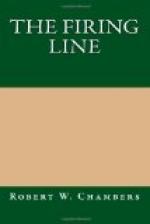“Perhaps you’ll get a telegram when the buckboard returns from Pride’s Fall,” said Hamil quietly. He, too, had been waiting for a letter that had not come. Days were lengthening into weeks since his departure from the South; and the letter he taught himself to expect had never come.
That she would write sooner or later he had dared believe at first; and then, as day after day passed, belief faded into hope; and now the colours of hope were fading into the gray tension of suspense.
He had written her every day, cheerful, amusing letters of current commonplaces which now made up his life. In them was not one hint of love—no echo of former intimacy, nothing of sadness, or regret, only a friendly sequence of messages, of inquiries, of details recounting the events of the days as they dawned and faded through the silvery promise of spring in the chill of the Northern hills.
Every morning and evening the fleet little Morgans came tearing in from Pride’s Fall with the big leather mail-bag, which bore Portlaw’s initials in metal, bulging with letters, newspapers, magazines for Portlaw; and now and then a slim envelope for him from his aunt, or letters, bearing the Palm Beach post-mark, from contractors on the Cardross estate, or from his own superintendent. But that was all.
His days were passed afoot in the forested hills, along lonely little lakes, following dashing trout-brooks or studying the United States Geological Survey maps which were not always accurate in minor details of contour, and sometimes made a mockery of the lesser water-courses, involving him and his surveyors in endless complications.
Sometimes, toward evening, if the weather was mild, he and Portlaw took their rods for a cast on Painted Creek—a noble trout stream which took its name from the dropping autumn glory of the sugar-bush where the water passed close to the house. There lithe, wild trout struck tigerishly at the flies and fought like demons, boring Portlaw intensely, who preferred to haul in a prospective dinner without waste of energy, and be about the matter of a new sauce with his cook.
CHAPTER XX
A NEW ENEMY
One evening in April, returning with a few brace of trout, they found the mail-bag awaiting them on the hall table; and Portlaw distributed the contents, proclaiming, as usual, his expectation of a letter from Malcourt.
There was none. And, too peevish and disappointed to even open the heterogeneous mass of letters and newspapers, he slumped sulkily in his chair, feet on the fender, biting into his extinct cigar.
“That devilish Louis,” he said, “has been away for several of the most accursedly lonely weeks I ever spent.... No reflection on you, Hamil—Oh, I beg your pardon; I didn’t see you were busy—”
Hamil had not even heard him. He was busy—very busy with a letter—dozens of sheets of a single letter, closely written, smeared in places—the letter that had come at last!




